So much happens outside Taylor, but what does any of it have to do with you? The world can seem like an overwhelming web of stories, and this column will help you find your place inside it. Sit down with me as we explore the bridges that connect us to the rest of the world.
By Abigail Pollock | Echo
I have a confession to make.
I have an unreasonable fondness for Russian President Vladimir Putin.
It's not what you think. My admiration has nothing to do with his tendency to pose shirtless with large animals and more to do with his political savvy. As a student of international relations, I admire those who play the game well.
And it is a game.
Some theorize that athletic competition is popular, in part, because it re-enacts characteristics of traditional warfare. Equally, for those who appreciate tactical strategy, international relations may hold the same fascination as a good game of chess.
Why is strategy an important part of politics? For powerful nations like the United States, Russia or China, the end goal is always the expansion of hegemony-regional or global dominance. Competition for power and resources often brings states into conflict, especially in a world as interdependent and globalized as ours.
Putin perceives the European Union and the United States to be genuine threats to its sovereignty, and the U.S. is equally concerned with the expansion of Russian influence. The White House uses its European partners to draw trade and military agreements toward Europe and away from Russia. NATO-a Cold War-era alliance of states created to counter the U.S.S.R. in Eastern Europe- has recently undergone three expansions of military and economic force. This includes a missile defense system in Europe which threatens Russia's nuclear capabilities and balance of power.
In response, Russia has crafted a foreign policy strategy that includes expanding the Russian economy through oil exports, regaining control of Eastern Europe and leveraging the decline of U.S. international influence in the Middle East.
Putin demonstrated this strategy with his actions in Syria. He vetoed Security Council resolutions against Syrian President Assad. When Obama wavered over his "red line" and threatened to intervene militarily in Syria, it was Putin who stepped in to offer a diplomatic solution. This intervention allowed the U.S. to save face while simultaneously letting Russia shrewdly replace the U.S. as the leading voice and power not only in the Syria issue, but in other areas of global politics as well.
The current crisis in Ukraine is another theater for the power struggle between Russia and the West. Ukraine was divided between European and Russian interests, with the U.S. and Europe supporting the political coup which just recently placed a European-leaning president in power. Russia responded by annexing the primarily-Russian region of the country, claiming that Ukraine's current government is illegitimate, backed by Western puppeteers, and a threat to Russian citizens living in Ukraine. These actions follow a pattern of "soft annexation," in which Russia increases its influence over the foreign policies of former Soviet states, according to analysts at The Atlantic.
One tactic that sets Russia apart from the United States is its ability to follow through in supporting its allies. The U.S. is often hindered by standards-from economic policy to human rights concerns-that prevent its government from openly or consistently supporting allies who don't measure up to its democratic ideals. Russia, however, has less scruples and therefore more freedom to invest in military assets, provide economic benefits for loyal allies and defend trading partners.
With the number of times the U.S. has armed and later deposed strategic allies (see Saddam Hussein), Russia may bill itself as a more consistent and protective ally to those who could use a powerful friend in the international arena.
Russia has oil resources, nuclear weapons and military force at its disposal and is clearly not hesitant to throw its weight around. When compared to the influence of the United States, however, the Russian Federation is still in a fairly weak position.
Putin postures as a leader with much more power than he actually has, which may be the source of his controversial figure. Is he a madman willing to destroy Russia in the pursuit of a dream of regained U.S.S.R. dominance? Or is he a master strategist manipulating his underdog position to increase the regional and global influence of Russia?
Time will tell if Putin's tactics prove to be successful. But if he is truly a strategist, fighting against all odds to improve the standing of Russia on the international stage, is it wrong to admire him? Russia has been the subject of much condemnation, from violations of international law to the perpetuation of human rights abuses. They have supported dictators and staged military invasions.
Then again, so has the United States.
No government has a corner on moral superiority, especially when it comes to international relations. Most political theory recognizes that states are motivated by national interest, which echoes what we know of self-centered human nature. An "ends justify the means" approach to pursuing national interest also puts all kinds of unsavory methods on the table: arms deals to terror groups, illegal surveillance, torture, assassination, deposing the governments of foreign states, war.
Politics as a whole is full of ethical dilemmas, which is what makes the arena both interesting and uncomfortable. In a world that is not black and white, we find ourselves in tension between ideals and realism, morality and effectiveness.
I am aware of the consequences of political action. The decisions of the powerful always have consequences, often inflicted on the most vulnerable. As someone who upholds the value of human life and dignity, I remain committed to opposing injustice and abuse of power in whatever context it is found: in NATO or the U.N., Russia or the United States.
From the perspective of a strategist, I will remain unapologetic in my admiration for Putin.
From the perspective of a Christian, I know better than to put my hope on morality in politics.
(Thumbnail photograph courtesy of Reuters)




